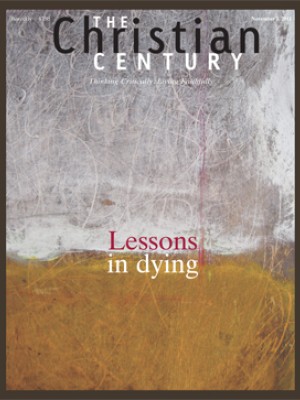Three women activists take peace prizes
Leymah Gbowee, a Liberian activist who helped bring her country out of a brutal civil war and one of the 2011 Nobel Peace Prize winners, says the best way to achieve global peace is to start in local communities.
"It is time for us to do justice in our communities. . . . One day the world's problems will meet you at your doorstep," she said October 7 at the Interchurch Center in New York. Coincidentally, she was there at a long-planned event organized by the National Council of Churches when the prize winners were announced.
Gbowee, citing the examples of peace and justice campaigners such as Martin Luther King Jr. and Archbishop Desmond Tutu, said she does not believe it is possible to practice nonviolent action without some connection to a higher power. "My faith has really helped me," said Gbowee, a member of the Lutheran Church in Liberia.
Read our latest issue or browse back issues.
The Nobel committee announced October 7 that Gbowee, Liberian president Ellen Johnson Sirleaf and Yemen's Tawakkul Karman, who leads opposition to dictatorial president Ali Abdullah Saleh, would share the prize. Faith groups worldwide hailed the recognition of activists for justice and women's rights.
The Norwegian Nobel committee recognized Karman, a Yemeni journalist and human rights advocate, as representative of thousands of activists, including women, in the Arab Spring from Tunisia to Syria.
Johnson Sirleaf, a member of First United Methodist Church, Monrovia, Liberia, in 2006 was the first woman to be elected a head of state in modern Africa. In her inauguration speech, she said: "Women have endured injustices and inhumane treatment; yet, it is the women who have labored and advocated for peace."
The peace prize announcement, which was made only days before Johnson Sirleaf, 72, was up for reelection October 11, was reportedly called "provocative" by her chief rival for the office, Winston Tubman, a Harvard-educated lawyer. If a runoff vote is needed, it will be scheduled for November.
Bishop John Innis, who leads Liberia's 170,000 United Methodists, introduced Johnson Sirleaf to the 2008 United Methodist quadrennial conference in Fort Worth, Texas, where she addressed the delegates.
Gbowee, who organized Christian and Muslim women to challenge Liberia's warlords, was honored for her efforts across ethnic and religious dividing lines to bring an end to the country's 14-year war and to ensure women's participation in elections. She trained as a trauma counselor during the war and worked with former child soldiers. The Liberian civil war ended in 2003.
Speaking of Johnson Sirleaf, Gbowee said every time "she sees me coming, she's weary" because "I always say, 'Madame President, you need to do this, this, this.'" But, Gbowee added, "We have a good professional relationship, like mother and daughter."
Gbowee, who was to return to Liberia after the reception, was in the U.S. to promote her memoir, Mighty Be Our Powers: How Sisterhood, Prayer, and Sex Changed a Nation at War. Her story is featured in a documentary, Women, War and Peace, which premiered in October on Public Broadcasting stations. —ENInews






